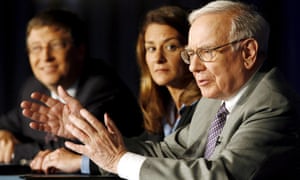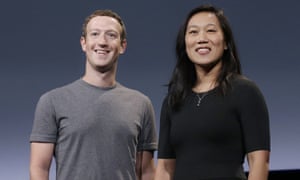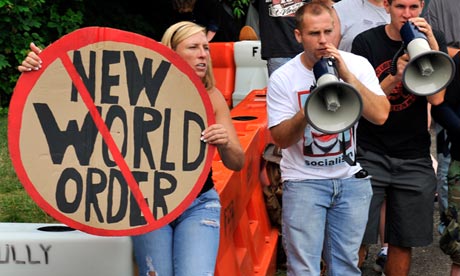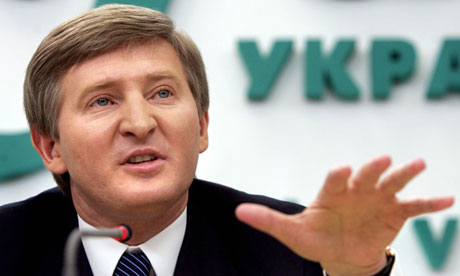In February 2017, Facebook’s founder and CEO Mark Zuckerberg was in the headlines for his charitable activities. The Chan Zuckerberg Initiative, founded by the tech billionaire and his wife, Priscilla Chan, handed out over $3m in grants to aid the housing crisis in the Silicon Valley area. David Plouffe, the Initiative’s president of policy and advocacy, stated that the grants were intended to “support those working to help families in immediate crisis while supporting research into new ideas to find a long-term solution – a two-step strategy that will guide much of our policy and advocacy work moving forward”.
This is but one small part of Zuckerberg’s charity empire. The Initiative has committed billions of dollars to philanthropic projects designed to address social problems, with a special focus on solutions driven by science, medical research and education. This all took off in December 2015, when Zuckerberg and Chan wrote and published a letter to their new baby Max. The letter made a commitment that over the course of their lives they would donate 99% of their shares in Facebook (at the time valued at $45bn) to the “mission” of “advancing human potential and promoting equality”.
The housing intervention is of course much closer to home, dealing with issues literally at the door of Facebook’s Menlo Park head office. This is an area where median house prices almost doubled to around $2m in the five years between 2012 and 2017.
More generally, San Francisco is a city with massive income inequality, and the reputation of having the most expensive housing in the US. Chan Zuckerberg’s intervention was clearly designed to offset social and economic problems caused by rents and house prices having skyrocketed to such a level that even tech workers on six-figure salaries find it hard to get by. For those on more modest incomes, supporting themselves, let alone a family, is nigh-on impossible.
Ironically, the boom in the tech industry in this region – a boom Facebook has been at the forefront of – has been a major contributor to the crisis. As Peter Cohen from the Council of Community Housing Organizations explained it: “When you’re dealing with this total concentration of wealth and this absurd slosh of real-estate money, you’re not dealing with housing that’s serving a growing population. You’re dealing with housing as a real-estate commodity for speculation.”
Zuckerberg’s apparent generosity, it would seem, is a small contribution to a large problem that was created by the success of the industry he is involved in. In one sense, the housing grants (equivalent to the price of just one-and-a-half average Menlo Park homes) are trying to put a sticking plaster on a problem that Facebook and other Bay Area corporations aided and abetted. It would appear that Zuckerberg was redirecting a fraction of the spoils of neoliberal tech capitalism, in the name of generosity, to try to address the problems of wealth inequality created by a social and economic system that allowed those spoils to accrue in the first place.
It is easy to think of Zuckerberg as some kind of CEO hero – a once regular kid whose genius made him one of the richest men in the world, and who decided to use that wealth for the benefit of others. The image he projects is of altruism untainted by self-interest. A quick scratch of the surface reveals that the structure of Zuckerberg’s charity enterprise is informed by much more than good-hearted altruism. Even while many have applauded Zuckerberg for his generosity, the nature of this apparent charity was openly questioned from the outset.
The wording of Zuckerberg’s 2015 letter could easily have been interpreted as meaning that he was intending to donate $45bn to charity. As investigative reporter Jesse Eisinger reported at the time, the Chan Zuckerberg Initiative through which this giving was to be funnelled is not a not-for-profit charitable foundation, but a limited liability company. This legal status has significant practical implications, especially when it comes to tax. As a company, the Initiative can do much more than charitable activity: its legal status gives it rights to invest in other companies, and to make political donations. Effectively the company does not restrict Zuckerberg’s decision-making as to what he wants to do with his money; he is very much the boss. Moreover, as Eisinger described it, Zuckerberg’s bold move yielded a huge return on investment in terms of public relations for Facebook, even though it appeared that he simply “moved money from one pocket to the other” while being “likely never to pay any taxes on it”.
The creation of the Chan Zuckerberg Initiative – decidedly not a charity organisation – means that Zuckerberg can control the company’s investments as he sees fit, while accruing significant commercial, tax and political benefits. All of this is not to say that Zuckerberg’s motives do not include some expression of his own generosity or some genuine desire for humanity’s wellbeing and equality.
What it does suggest, however, is that when it comes to giving, the CEO approach is one in which there is no apparent incompatibility between being generous, seeking to retain control over what is given, and the expectation of reaping benefits in return. This reformulation of generosity – in which it is no longer considered incompatible with control and self-interest – is a hallmark of the “CEO society”: a society where the values associated with corporate leadership are applied to all dimensions of human endeavour.
Mark Zuckerberg was by no means the first contemporary CEO to promise and initiate large-scale donations of wealth to self-nominated good causes. In the CEO society it is positively a badge of honour for the world’s most wealthy businesspeople to create vehicles to give away their wealth. This has been institutionalised in what is known as The Giving Pledge, a philanthropy campaign initiated by Warren Buffett and Bill Gates in 2010. The campaign targets billionaires around the world, encouraging them to give away the majority of their wealth. There is nothing in the pledge that specifies what exactly the donations will be used for, or even whether they are to be made now or willed after death; it is just a general commitment to using private wealth for ostensibly public good. It is not legally binding either, but a moral commitment.
There is a long list of people and families who have made the pledge. Mark Zuckerberg and Priscilla Chan are there, and so are some 174 others, including household names such as Richard and Joan Branson, Michael Bloomberg, Barron Hilton and David Rockefeller. It would seem that many of the world’s richest people simply want to give their money away to good causes. This all amounts to what human geographers Iain Hay and Samantha Muller sceptically refer to as a “golden age of philanthropy”, in which, since the late 1990s, bequests to charity from the super-rich have escalated to the hundreds of billions of dollars. These new philanthropists bring to charity an “entrepreneurial disposition”, Hay and Muller wrote in a 2014 paper, yet one that they suggest has been “diverting attention and resources away from the failings of contemporary manifestations of capitalism”, and may also be serving as a substitute for public spending withdrawn by the state.
Warren Buffett announces a $30bn donation to the Bill and Melinda Gates Foundation, 2006. Photograph: Justin Lane/EPA
Essentially, what we are witnessing is the transfer of responsibility for public goods and services from democratic institutions to the wealthy, to be administered by an executive class. In the CEO society, the exercise of social responsibilities is no longer debated in terms of whether corporations should or shouldn’t be responsible for more than their own business interests. Instead, it is about how philanthropy can be used to reinforce a politico-economic system that enables such a small number of people to accumulate obscene amounts of wealth. Zuckerberg’s investment in solutions to the Bay Area housing crisis is an example of this broader trend.
The reliance on billionaire businesspeople’s charity to support public projects is a part of what has been called “philanthrocapitalism”. This resolves the apparent antinomy between charity (traditionally focused on giving) and capitalism (based on the pursuit of economic self-interest). As historian Mikkel Thorup explains, philanthrocapitalism rests on the claim that “capitalist mechanisms are superior to all others (especially the state) when it comes to not only creating economic but also human progress, and that the market and market actors are or should be made the prime creators of the good society”.
The golden age of philanthropy is not just about benefits that accrue to individual givers. More broadly, philanthropy serves to legitimise capitalism, as well as to extend it further and further into all domains of social, cultural and political activity.
Philanthrocapitalism is about much more than the simple act of generosity it pretends to be, instead involving the inculcation of neoliberal values personified by the billionaire CEOs who have led its charge. Philanthropy is recast in the same terms in which a CEO would consider a business venture. Charitable giving is translated into a business model that employs market-based solutions characterised by efficiency and quantified costs and benefits.
Philanthrocapitalism takes the application of management discourses and practices from business corporations and adapts them to charitable work. The focus is on entrepreneurship, market-based approaches and performance metrics. The process is funded by super-rich businesspeople and managed by those experienced in business. The result, at a practical level, is that philanthropy is undertaken by CEOs in a manner similar to how they would run businesses.
As part of this, charitable foundations have changed in recent years. As explained in a paper by Garry Jenkins, a professor of law at the University of Minnesota, this involves becoming “increasingly directive, controlling, metric-focused and business-oriented with respect to their interactions with grantee public charities, in an attempt to demonstrate that the work of the foundation is ‘strategic’ and ‘accountable’”.
This is far from the benign shift to a different and better way of doing things that it claims to be – a CEO style to “save the world through business thinking and market methods”, as Jenkins puts it. Instead, the risk of philanthrocapitalism is a takeover of charity by business interests, such that generosity to others is appropriated into the overarching dominance of the CEO model of society and its corporate institutions.
The modern CEO is very much at the forefront of the political and media stage. While this often leads to CEOs becoming vaunted celebrities, it also leaves them open to being identified as scapegoats for economic injustice. The increasingly public role taken by CEOs is related to a renewed corporate focus on their wider social responsibility. Firms must now balance, at least rhetorically, a dual commitment to profit and social outcomes. This has been reflected in the promotion of the “triple bottom line”, which combines social, financial and environmental priorities in corporate reporting.
This turn toward social responsibility represents a distinct problem for CEOs. While firms may be willing to sacrifice some short-term profit for the sake of preserving their public reputation, this same bargain is rarely on offer to CEOs themselves, who are judged on their quarterly reports and how well they are serving the fiscal interests of their shareholders. Thus, whereas social responsibility strategies may win public kudos, in the confines of the boardroom it is often a different story, especially when the budget is being scrutinised.
There is a further economic incentive for CEOs to avoid making fundamental changes to their operations in the name of social justice, in that a large portion of CEO remuneration often consists of company stock and options. Accepting fair trade policies and closing sweatshops may be good for the world, but is potentially disastrous for a firm’s immediate financial success. What is ethically valuable to the voting and buying public is not necessarily of concrete value to corporations, nor personally beneficial to their top executives.
Many firms have sought to resolve this contradiction through high-profile philanthropy. Exploitative labour practices or corporate malpractice are swept under the carpet as companies publicise tax-efficient contributions to good causes. Such contributions may be a relatively small price to pay compared with changing fundamental operational practices. Likewise, giving to charity is a prime opportunity for CEOs to be seen to be doing good without having to sacrifice their commitment to making profit at any social cost. Charitable activity permits CEOs to be philanthropic rather than economically progressive or politically democratic.
There is an even more straightforward financial consideration at play in some cases. Charity can be an absolute boon to capital accumulation: corporate philanthropy has been shown to have a positive effect on perceptions by stock market analysts. At the personal level, CEOs can take advantage of promoting their individual charity to distract from other, less savoury activities; as an executive, they can cash in on the capital gains that can be made from introducing high-profile charity strategies.
The very notion of corporate social responsibility, or CSR, has been criticised for providing companies with a moral cover to act in quite exploitative and socially damaging ways. But in the current era, social responsibility, when portrayed as an individual character trait of chief executives, has allowed corporations to be run as irresponsibly as ever. CEOs’ very public engagement in philanthrocapitalism can be understood as a key component of this reputation management. It is part of the marketing of the firm itself, as the good deeds of its leaders come to signify the overall goodness of the corporation.
Ironically, philanthrocapitalism also grants corporations the moral right, at least within the public consciousness, to be socially irresponsible. The trumpeting of the CEOs’ personal generosity can grant an implicit right for their corporations to act ruthlessly and with little consideration for the broader social effects of their activities. This reflects a productive tension at the heart of modern CSR: the more moral a CEO, the more immoral their company can in theory seek to be.
The hypocrisy revealed by CEOs claiming to be dedicated to social responsibility and charity also exposes a deeper authoritarian morality that prevails in the CEO society. Philanthrocapitalism is commonly presented as the social justice component of an otherwise amoral global free market. At best, corporate charity is a type of voluntary tax paid by the 1% for their role in creating such an economically deprived and unequal world. Yet this “giving” culture also helps support and spread a distinctly authoritarian form of economic development that mirrors the autocratic leadership style of the executives who predominantly fund it.
The marketisation of global charity and empowerment has dangerous implications that transcend economics. It also has a troubling emerging political legacy, one in which democracy is sacrificed on that altar of executive-style empowerment. Politically, the free market is posited as a fundamental requirement for liberal democracy. However, recent analysis reveals the deeper connection between processes of marketisation and authoritarianism. In particular, a strong government is required to implement these often unpopular market changes. The image of the powerful autocrat is, to this effect, transformed into a potentially positive figure, a forward-thinking political leader who can guide their country on the correct market path in the face of “irrational” opposition. Charity becomes a conduit for CEOs to fund these “good” authoritarians.
Essentially, what we are witnessing is the transfer of responsibility for public goods and services from democratic institutions to the wealthy, to be administered by an executive class. In the CEO society, the exercise of social responsibilities is no longer debated in terms of whether corporations should or shouldn’t be responsible for more than their own business interests. Instead, it is about how philanthropy can be used to reinforce a politico-economic system that enables such a small number of people to accumulate obscene amounts of wealth. Zuckerberg’s investment in solutions to the Bay Area housing crisis is an example of this broader trend.
The reliance on billionaire businesspeople’s charity to support public projects is a part of what has been called “philanthrocapitalism”. This resolves the apparent antinomy between charity (traditionally focused on giving) and capitalism (based on the pursuit of economic self-interest). As historian Mikkel Thorup explains, philanthrocapitalism rests on the claim that “capitalist mechanisms are superior to all others (especially the state) when it comes to not only creating economic but also human progress, and that the market and market actors are or should be made the prime creators of the good society”.
The golden age of philanthropy is not just about benefits that accrue to individual givers. More broadly, philanthropy serves to legitimise capitalism, as well as to extend it further and further into all domains of social, cultural and political activity.
Philanthrocapitalism is about much more than the simple act of generosity it pretends to be, instead involving the inculcation of neoliberal values personified by the billionaire CEOs who have led its charge. Philanthropy is recast in the same terms in which a CEO would consider a business venture. Charitable giving is translated into a business model that employs market-based solutions characterised by efficiency and quantified costs and benefits.
Philanthrocapitalism takes the application of management discourses and practices from business corporations and adapts them to charitable work. The focus is on entrepreneurship, market-based approaches and performance metrics. The process is funded by super-rich businesspeople and managed by those experienced in business. The result, at a practical level, is that philanthropy is undertaken by CEOs in a manner similar to how they would run businesses.
As part of this, charitable foundations have changed in recent years. As explained in a paper by Garry Jenkins, a professor of law at the University of Minnesota, this involves becoming “increasingly directive, controlling, metric-focused and business-oriented with respect to their interactions with grantee public charities, in an attempt to demonstrate that the work of the foundation is ‘strategic’ and ‘accountable’”.
This is far from the benign shift to a different and better way of doing things that it claims to be – a CEO style to “save the world through business thinking and market methods”, as Jenkins puts it. Instead, the risk of philanthrocapitalism is a takeover of charity by business interests, such that generosity to others is appropriated into the overarching dominance of the CEO model of society and its corporate institutions.
The modern CEO is very much at the forefront of the political and media stage. While this often leads to CEOs becoming vaunted celebrities, it also leaves them open to being identified as scapegoats for economic injustice. The increasingly public role taken by CEOs is related to a renewed corporate focus on their wider social responsibility. Firms must now balance, at least rhetorically, a dual commitment to profit and social outcomes. This has been reflected in the promotion of the “triple bottom line”, which combines social, financial and environmental priorities in corporate reporting.
This turn toward social responsibility represents a distinct problem for CEOs. While firms may be willing to sacrifice some short-term profit for the sake of preserving their public reputation, this same bargain is rarely on offer to CEOs themselves, who are judged on their quarterly reports and how well they are serving the fiscal interests of their shareholders. Thus, whereas social responsibility strategies may win public kudos, in the confines of the boardroom it is often a different story, especially when the budget is being scrutinised.
There is a further economic incentive for CEOs to avoid making fundamental changes to their operations in the name of social justice, in that a large portion of CEO remuneration often consists of company stock and options. Accepting fair trade policies and closing sweatshops may be good for the world, but is potentially disastrous for a firm’s immediate financial success. What is ethically valuable to the voting and buying public is not necessarily of concrete value to corporations, nor personally beneficial to their top executives.
Many firms have sought to resolve this contradiction through high-profile philanthropy. Exploitative labour practices or corporate malpractice are swept under the carpet as companies publicise tax-efficient contributions to good causes. Such contributions may be a relatively small price to pay compared with changing fundamental operational practices. Likewise, giving to charity is a prime opportunity for CEOs to be seen to be doing good without having to sacrifice their commitment to making profit at any social cost. Charitable activity permits CEOs to be philanthropic rather than economically progressive or politically democratic.
There is an even more straightforward financial consideration at play in some cases. Charity can be an absolute boon to capital accumulation: corporate philanthropy has been shown to have a positive effect on perceptions by stock market analysts. At the personal level, CEOs can take advantage of promoting their individual charity to distract from other, less savoury activities; as an executive, they can cash in on the capital gains that can be made from introducing high-profile charity strategies.
The very notion of corporate social responsibility, or CSR, has been criticised for providing companies with a moral cover to act in quite exploitative and socially damaging ways. But in the current era, social responsibility, when portrayed as an individual character trait of chief executives, has allowed corporations to be run as irresponsibly as ever. CEOs’ very public engagement in philanthrocapitalism can be understood as a key component of this reputation management. It is part of the marketing of the firm itself, as the good deeds of its leaders come to signify the overall goodness of the corporation.
Ironically, philanthrocapitalism also grants corporations the moral right, at least within the public consciousness, to be socially irresponsible. The trumpeting of the CEOs’ personal generosity can grant an implicit right for their corporations to act ruthlessly and with little consideration for the broader social effects of their activities. This reflects a productive tension at the heart of modern CSR: the more moral a CEO, the more immoral their company can in theory seek to be.
The hypocrisy revealed by CEOs claiming to be dedicated to social responsibility and charity also exposes a deeper authoritarian morality that prevails in the CEO society. Philanthrocapitalism is commonly presented as the social justice component of an otherwise amoral global free market. At best, corporate charity is a type of voluntary tax paid by the 1% for their role in creating such an economically deprived and unequal world. Yet this “giving” culture also helps support and spread a distinctly authoritarian form of economic development that mirrors the autocratic leadership style of the executives who predominantly fund it.
The marketisation of global charity and empowerment has dangerous implications that transcend economics. It also has a troubling emerging political legacy, one in which democracy is sacrificed on that altar of executive-style empowerment. Politically, the free market is posited as a fundamental requirement for liberal democracy. However, recent analysis reveals the deeper connection between processes of marketisation and authoritarianism. In particular, a strong government is required to implement these often unpopular market changes. The image of the powerful autocrat is, to this effect, transformed into a potentially positive figure, a forward-thinking political leader who can guide their country on the correct market path in the face of “irrational” opposition. Charity becomes a conduit for CEOs to fund these “good” authoritarians.
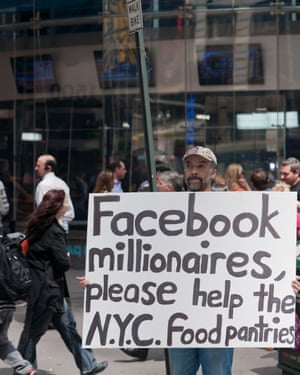
A protester outside the Nasdaq headquarters in New York marks Facebook’s IPO, 2012. Photograph: Alamy Stock Photo
The recent development of philanthrocapitalism also marks the increasing encroachment of business into the provision of public goods and services. This encroachment is not limited to the activities of individual billionaires; it is also becoming a part of the activities of large corporations under the rubric of CSR. This is especially the case for large multinational corporations whose global reach, wealth and power give them significant political clout. This relationship has been referred to as “political CSR”. Business ethics professors Andreas Scherer and Guido Palazzo note that, for large corporations, “CSR is increasingly displayed in corporate involvement in the political process of solving societal problems, often on a global scale”. Such political CSR initiatives see organisations cooperating and collaborating with governments, civic bodies and international institutions, so that historical separations between the purposes of the state and the corporations are increasingly eroded.
Global corporations have long been involved in quasi-governmental activities such as the setting of standards and codes, and today are increasingly engaging in other activities that have traditionally been the domain of government, such as public health provision, education, the protection of human rights, addressing social problems such as Aids and malnutrition, protection of the natural environment and the promotion of peace and social stability.
Today, large organisations can amass significant economic and political power, on a global scale. This means that their actions – and the way those actions are regulated – have far-reaching social consequences. The balanced tipped in 2000, when the Institute for Policy Studies in the US reported, after comparing corporate revenues with gross domestic product (GDP), that 51 of the largest economies in the world were corporations, and 49 were national economies. The biggest corporations were General Motors, Walmart and Ford, each of which was larger economically than Poland, Norway and South Africa. As the heads of these corporations, CEOs are now quasi-politicians. One only has to think of the increasing power of the World Economic Forum, whose annual meeting in Davos in Switzerland sees corporate CEOs and senior politicians getting together with the ostensible goal of “improving the world”, a now time-honoured ritual that symbolises the global power and agency of CEOs.
The development of CSR is not the result of self-directed corporate initiatives for doing good deeds, but a response to widespread CSR activism from NGOs, pressure groups and trade unions. Often this has been in response to the failure of governments to regulate large corporations. High-profile industrial accidents and scandals have also put pressure on organisations for heightened self-regulation.
An explosion at a Union Carbide chemical plant in Bhopal, India in 1984 led to the deaths of an estimated 25,000 people. James Post, a professor of management at Boston University, explains that, after the disaster, “the global chemical industry recognised that it was nearly impossible to secure a licence to operate without public confidence in industry safety standards. The Chemical Manufacturers Association (CMA) adopted a code of conduct, including new standards of product stewardship, disclosure and community engagement.”
The impetus for this was corporate self-interest, rather than generosity, as industries and corporations globally “began to recognise the increasing importance of reputation and image”. Similar moves were enacted after other major industrial accidents, such as the Exxon Valdez oil tanker spilling hundreds of thousands of barrels of oil in Alaska in 1989, and BP’s Deepwater Horizon oil rig exploding in the Gulf of Mexico in 2010.
The Deepwater Horizon oil rig ablaze in the Gulf of Mexico, April 2010.
Photograph: Handout/Getty Images
Another important case was the involvement of the clothing companies Gap and Nike in a child labour scandal after the broadcast of a BBC Panorama documentary in October 2000. Factories in Cambodia making Gap and Nike clothing were shown to operate with terrible working conditions, involving children as young as 12 working seven days a week, being forced to do overtime, and enduring physical and emotional abuse from management. The public outcry that ensued demanded that Gap and Nike, and other organisations like them, take more responsibility for the negative human social impacts of their business practices.
CSR was introduced in order to reduce the ill effects of corporate self-interest. But over time it has turned into a means for further enhancing that self-interest while ostensibly claiming to be addressing the interests of others. When facing the threat of corporate scandal, CSR is seen as the vehicle through which corporate reputation can be boosted, and the threat of government regulation can be mitigated. Again, here we see how corporations engage in seemingly responsible practices in order to increase their own political power, and to diminish the power of nation states over their own operations.
The idea that organisations adopt CSR for the purposes of developing or defending a corporate reputation has put the ethics of CSR under scrutiny. The contention has arisen that, rather than using CSR as a means of “being good”, corporations adopt it merely as a means of “looking good”, while not in any way questioning their basic ethical or political stance. Even Enron, before its legendary fraud scandal and eventual demise in 2001, was well known for its advocacy of social responsibility.
CEO generosity is epic in proportions – or at least that is how it is portrayed. Indeed, on an individual level it is hard to find fault with those rich people who have given away vast swaths of their wealth to charitable causes, or those corporations that champion socially responsible programmes. But what CSR and philanthrocapitalism achieve more broadly is the social justification of extreme wealth inequality, rather than any kind of antidote to it. We need to note here that, despite the apparent proliferation of giving promised by philanthrocapitalism, the so-called golden age of philanthropy is also an age of expanding inequality.
This is clearly spelled out a 2017 report by Oxfam called An Economy for the 99%. It highlights the injustice and unsustainability of a world suffering from widening levels of inequality: since the early 1990s, the top 1% of the world’s wealthy people have gained more income than the entire bottom 50%. Why so? Oxfam’s report places the blame firmly with corporations and the global market economies in which they operate. The statistics are alarming, with the world’s 10 biggest corporations having revenues that exceed the total combined revenues of the 180 least wealthy nations. Corporate social responsibility is not making any real difference. The report states: “When corporations increasingly work for the rich, the benefits of economic growth are denied to those who need them most. In pursuit of delivering high returns to those at the top, corporations are driven to squeeze their workers and producers ever harder – and to avoid paying taxes which would benefit everyone, and the poorest people in particular.”
Neither the philanthropy of the super-rich nor socially directed corporate programmes have any real effect on combating this trend, in the same way that Zuckerberg’s handout of $3m will have a negligible effect on the San Francisco housing crisis. Instead, vast fortunes in the hands of the few, whether earned through inheritance, commerce or crime, continue to grow at the expense of the poor.
In the end, it is capitalism that is at the heart of philanthrocapitalism, and the corporation that is at the heart of corporate social responsibility, with even well-meaning endeavours serving to justify a system that is rigged in favour of the rich.
What is particular about this new approach is not that rich people are supporting charitable endeavours, but that it involves, as sociologist Linsey McGoey explains, “an openness that deliberately collapses the distinction between public and private interests, in order to justify increasingly concentrated levels of private gain”.
Photograph: Handout/Getty Images
Another important case was the involvement of the clothing companies Gap and Nike in a child labour scandal after the broadcast of a BBC Panorama documentary in October 2000. Factories in Cambodia making Gap and Nike clothing were shown to operate with terrible working conditions, involving children as young as 12 working seven days a week, being forced to do overtime, and enduring physical and emotional abuse from management. The public outcry that ensued demanded that Gap and Nike, and other organisations like them, take more responsibility for the negative human social impacts of their business practices.
CSR was introduced in order to reduce the ill effects of corporate self-interest. But over time it has turned into a means for further enhancing that self-interest while ostensibly claiming to be addressing the interests of others. When facing the threat of corporate scandal, CSR is seen as the vehicle through which corporate reputation can be boosted, and the threat of government regulation can be mitigated. Again, here we see how corporations engage in seemingly responsible practices in order to increase their own political power, and to diminish the power of nation states over their own operations.
The idea that organisations adopt CSR for the purposes of developing or defending a corporate reputation has put the ethics of CSR under scrutiny. The contention has arisen that, rather than using CSR as a means of “being good”, corporations adopt it merely as a means of “looking good”, while not in any way questioning their basic ethical or political stance. Even Enron, before its legendary fraud scandal and eventual demise in 2001, was well known for its advocacy of social responsibility.
CEO generosity is epic in proportions – or at least that is how it is portrayed. Indeed, on an individual level it is hard to find fault with those rich people who have given away vast swaths of their wealth to charitable causes, or those corporations that champion socially responsible programmes. But what CSR and philanthrocapitalism achieve more broadly is the social justification of extreme wealth inequality, rather than any kind of antidote to it. We need to note here that, despite the apparent proliferation of giving promised by philanthrocapitalism, the so-called golden age of philanthropy is also an age of expanding inequality.
This is clearly spelled out a 2017 report by Oxfam called An Economy for the 99%. It highlights the injustice and unsustainability of a world suffering from widening levels of inequality: since the early 1990s, the top 1% of the world’s wealthy people have gained more income than the entire bottom 50%. Why so? Oxfam’s report places the blame firmly with corporations and the global market economies in which they operate. The statistics are alarming, with the world’s 10 biggest corporations having revenues that exceed the total combined revenues of the 180 least wealthy nations. Corporate social responsibility is not making any real difference. The report states: “When corporations increasingly work for the rich, the benefits of economic growth are denied to those who need them most. In pursuit of delivering high returns to those at the top, corporations are driven to squeeze their workers and producers ever harder – and to avoid paying taxes which would benefit everyone, and the poorest people in particular.”
Neither the philanthropy of the super-rich nor socially directed corporate programmes have any real effect on combating this trend, in the same way that Zuckerberg’s handout of $3m will have a negligible effect on the San Francisco housing crisis. Instead, vast fortunes in the hands of the few, whether earned through inheritance, commerce or crime, continue to grow at the expense of the poor.
In the end, it is capitalism that is at the heart of philanthrocapitalism, and the corporation that is at the heart of corporate social responsibility, with even well-meaning endeavours serving to justify a system that is rigged in favour of the rich.
What is particular about this new approach is not that rich people are supporting charitable endeavours, but that it involves, as sociologist Linsey McGoey explains, “an openness that deliberately collapses the distinction between public and private interests, in order to justify increasingly concentrated levels of private gain”.
In the CEO society, corporate logic such as this rules supreme, and ensures that any activities thought of as generous and socially responsible ultimately have a payoff in terms of self-interest. If there was ever a debate between the ethics of genuine hospitality, reciprocity and self-interest, it is not to be found here. It is in accordance with this CEO logic that the mechanisms for redressing the inequality created through wealth generation are placed in the hands of the wealthy, and in a way that ultimately benefits them. The worst excesses of neoliberal capitalism are morally justified by the actions of the very people who benefit from those excesses. Wealth redistribution is placed in the hands of the wealthy, and social responsibility in the hands of those who have exploited society for personal gain.
Meanwhile, inequality is growing, and both corporations and the wealthy find ways to avoid the taxes that the rest of us pay. In the name of generosity, we find a new form of corporate rule, refashioning another dimension of human endeavour in its own interests. Such is a society where CEOs are no longer content to do business; they must control public goods as well. In the end, while the Giving Pledge’s website may feature more and more smiling faces of smug-looking CEOs, the real story is of a world characterised by gross inequality that is getting worse year by year.
